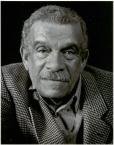 This afternoon I had the good fortune of seeing Derek Walcott read at the Metropolis Bleu Festival here in Montreal. This is one reading I'll remember for the rest of my life. Before today I really had no awareness of the enormity of this man's poetic accomplishment, and the four poems selected in my Norton Modern Poetry (well, it is the 1973 edition) which I read before the reading gave me the only the slenderest hint. From the vast and varied Collected to the epic Omeros, he opens up worlds. I'm brought to mind of Octavio Paz's distinction between "central" and "eccentric" poets. (Example: T.S. Eliot is central, H.D. eccentric) Although isolated on the margins in the Caribbean, Walcott manages to be a most central of poets not only in the authority with which he expresses the rich and vivid elementals of his native land, but the assuredeness with which he draws upon a rock-solid foundation in the Western mythological tradition. The analogy between the islands of the Caribbean and the journey of Odysseus is entirely authentic and natural -- I am brought to mind of George Seferis' Mythistorima or Pablo Antonio Cuadra's Songs of Cifar and the Sweet Sea. He reminds me that drawing upon traditional mythological sources can render a poet into an instant time traveller, giving access to depths -- and heights -- beyond the narrow here and now. Note to myself: must go back to that... back to that hoary Old Testament, perhaps something "new" from Buddhist or Aboriginal traditions... that'll be quite an excavation.
This afternoon I had the good fortune of seeing Derek Walcott read at the Metropolis Bleu Festival here in Montreal. This is one reading I'll remember for the rest of my life. Before today I really had no awareness of the enormity of this man's poetic accomplishment, and the four poems selected in my Norton Modern Poetry (well, it is the 1973 edition) which I read before the reading gave me the only the slenderest hint. From the vast and varied Collected to the epic Omeros, he opens up worlds. I'm brought to mind of Octavio Paz's distinction between "central" and "eccentric" poets. (Example: T.S. Eliot is central, H.D. eccentric) Although isolated on the margins in the Caribbean, Walcott manages to be a most central of poets not only in the authority with which he expresses the rich and vivid elementals of his native land, but the assuredeness with which he draws upon a rock-solid foundation in the Western mythological tradition. The analogy between the islands of the Caribbean and the journey of Odysseus is entirely authentic and natural -- I am brought to mind of George Seferis' Mythistorima or Pablo Antonio Cuadra's Songs of Cifar and the Sweet Sea. He reminds me that drawing upon traditional mythological sources can render a poet into an instant time traveller, giving access to depths -- and heights -- beyond the narrow here and now. Note to myself: must go back to that... back to that hoary Old Testament, perhaps something "new" from Buddhist or Aboriginal traditions... that'll be quite an excavation.Walcott's reading was warm and understated but dramatic. He struck me in his verse and in his mien as a man who had seen "it all", who had gone through world-weariness to the other side that is wisdom -- sombre but luminous, bleak but in the end, not at all pessimistic. And I loved the lilt of his accent...
Can't quote right now from what he read (I remember he read selections of The Schooner Flight that were quite impressive) because by the time I arrived at his book table all his work been sold out. A friend of mine fortunately was able to buy and have him sign perhaps the last remaining copy of his Collected, which I'll get my hands on soon enough when my friend feels he can lay it aside for a while.
2 comments:
Yes, Walcott is an important poet. Although attacked by critics for being too "baroque," I still think he has an ear and a mind for poetry that only a mere few writing today have.
I must admit I've never been engaged by what I've seen by Walcott on the page when skimming through his books. I've certainly appreciated other poets more after hearing them read; particularly Carl Phillips and Nikky Finney. But now I've gone back to look at Walcott's poems again, and I'm liking what I see. I can imagine how well they would sound being read aloud. BTW, I enjoyed your article in Rock Salt Plum.
Post a Comment